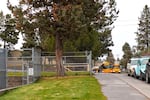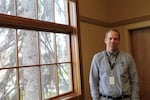As Oregon’s school year wraps up, lots of high schoolers have one thing they’re looking forward to: sleeping in. Many researchers can understand, contending their desire for sleep is partly the fault of their high school schedule, which can demand they get up earlier than their bodies should. School districts in Oregon are increasingly looking at shifting start times later, but it's not as simple as it sounds.

Former Portland city commissioner Steve Novick (left) listens as OHSU pediatrician Ben Hoffman lobbies for later high school start times at a Portland Public Schools board meeting, March 6, 2018.
PPS
Back in March, Steve Novick testified at a Portland Public school board meeting. Most Portland high schools start at 8:15, with Lincoln High starting a few minutes earlier.
The former city commissioner told board members those start times should be pushed later by close to an hour.
"The RAND Corporation says that it's estimated that if you give teenagers an extra hour of sleep, you can expect to see high school graduation rates improve by 13 percent, and college attendance improve by nine percent," said Novick.
Novick was joined by Dr. Ben Hoffman, a pediatrician at Oregon Health and Science University, who was speaking on behalf of the university and the Oregon Pediatric Society. He agreed with Novick that a more appropriate time to start high school was nine o'clock.
"Reviewing the literature that exists and the facts that are known, there's little doubt that teens would benefit from later start times," Hoffman told the school board.
"You can try and fight biology, but you almost assuredly will not win."
Oregon's largest school district is not considering a change to when high schools start — at least not now.
"We don't plan a review of start times for the coming school year," said director of strategic communications and outreach Harry Esteve in an email to OPB. However, Esteve noted that PPS middle schools "might be considered in the range of the later start times," with a 9:15 opening bell.

School buses arrive at Bend Senior High School at 7:15 a.m. on April 18, 2018.
Rob Manning / OPB
Changing when school starts is very much on the table in Bend, where high school starts at 7:45 am. But Bend has been down this road before.
"I've been in the district — in Bend-La Pine schools — for 13 years," said assistant superintendent Jay Mathison. "And this is the third time, that I'm aware of, that we've approached this topic."
Mathison said the argument to push high school start times later comes from education research, including a fairly convincing study out of University of Minnesota from several years ago. The reluctance comes from how hard it is to change. Top of the list in the large, rural district in central Oregon? Bus routes.
"There's a transportation conversation which happens every time this is considered — just about every place this is considered," said Mathison. "We have a fleet of buses, and we, in a sense, use them twice. The first time in the morning, we use them to get our middle and high school students to school."
Then, the buses go out again, to get the elementary schoolers. That's a fairly typical way to run school buses.
Running more buses, so that they wouldn't have to "double-route" would involve buying more vehicles and hiring more bus drivers, which would be expensive and logistically difficult based on the availability of bus drivers.

Bend La-Pine assistant superintendent Jay Mathison says the large central Oregon school district is discussing changing school schedules for the third time in his tenure in 2018.
Rob Manning / OPB
So, the most straight-forward way to change a bus plan like Bend’s is to flip it: pick up the elementary kids first, and round up the older students later.
But that scenario for younger kids has been problematic in Bend, especially when you imagine those dark winter mornings, says Mathison.
"In central Oregon, a place that has some cold winters, some snowy winters — you know, five and six and seven and eight year-olds walking to a bus stop in the dark, waiting at the bus stop in the dark, on some of those snowy mornings — that was a barrier,” Mathison said, referring to previous discussions of changing Bend's school schedules.
Not to mention, big changes are simply hard for people to get behind, including parents who have to consider their work and family schedules.
It’s not even a clear win among high school students. Outside Bend High School on a clear spring morning, freshman Katie Voyles and sophomore Justin Reed applauded starting later.
“I think that’s a good idea, because I think a lot of teenagers don’t really function as well until later in the morning — so get better grades and stuff," said Bend freshman Katie Voyles, as she approached school at 7:30 am.
“Teens are sort of wired to stay up later," said Bend sophomore Justin Reed. Reed said it's not as simple as turning in early.
"Sometimes I'll try that — going to bed earlier — but usually I'll just stay awake, in my bed," Reed said.
But sophomore — and morning person — Hanna Schmoyer likes the schedule the way it is.
"Honestly, for me, I'm personally fine with it, because waking up earlier, it gives me a boost," said Schmoyer said, acknowledging her classmates might feel differently. "It's nice to have time in the afternoon for sports, to hang out with friends, and homework."
Educators who are looking at a possible shift of schedules for both older students and younger ones, acknowledge that the research is clear on high schoolers, but lacking on the effect on younger students. Scott Edmondson is a principal at RE Jewell Elementary on the edge of Bend — a school that relies heavily on buses for students to get to school. Edmondson served on the school start time work group that came up with options for changing Bend's schedules.

Scott Edmondson is principal at RE Jewell Elementary School in the Bend-La Pine school district. His school's students could start class earlier, if Bend decides to push high school start times later.
Rob Manning / OPB
"We were able to find much more research on the adolescent brain than we were on the elementary-aged kiddo, and what that impact of starting earlier would be," Edmondson said. Elsewhere in Oregon, districts are debating later start times for high school, but several recent decisions are to keep things the same.
The David Douglas district was moving toward a later start time for the state's largest high school, which now starts at 7:40 a.m. The district backed off, however, after a survey found parents preferred keeping school schedules the same, based on family priorities, including work and child care schedules.
Something similar just happened in Eugene, where administrators proposed starting all four district high schools at 9:05 a.m, as part of a district-wide standardization of all school schedules. But after a series of community meetings, the Eugene school board voted to start high schools at 8:30 a.m.
East Portland's Parkrose changed high school start times two years ago, but only moved them back as far as 8:25 a.m. Spokesperson Andrea Stevens said administrators felt caught in a bind.
"We would've liked to start high school even later but that would interfere with after school extracurricular competitions," said Andrea Stevenson, a spokesperson for the Parkrose district.
And there's the rub. Whether it's after-school sports, or the effect on family schedules, actually moving start times is not easy.
Oregon's high school schedule debates invariably invoke Seattle, where Steve Novick notes high school starts no earlier than 8:45 a.m.
"I think we should beat Seattle, and go to at least nine," Novick said, drawing laughs from the audience at the March Portland Public Schools board meeting.
Seattle claims better high school attendance and behavior since schedules changed two years ago.
The Bend elementary principal, Edmondson, anticipates "calmer" mornings at his school, if his school started earlier so that high schools could start later. Seattle's experience provides a little insight into a possible benefit, later in the day, for groggy elementary kids who might have to wait at cold, dark street corners on early winter mornings.
KUOW visited Steph Turner's class at Whittier Elementary for a story in 2016, the first year it had later high school starts, and earlier ones for elementary schools.
"Last year, it feels like at the end of the day, they were so tired. But I feel like now, with the earlier start time they have a lot more energy — in a good way," Turner said, chuckling.
Bend-La Pine is taking it slow. The district is doing a survey and will use the results to help make a decision, for possible changes in fall 2019.
